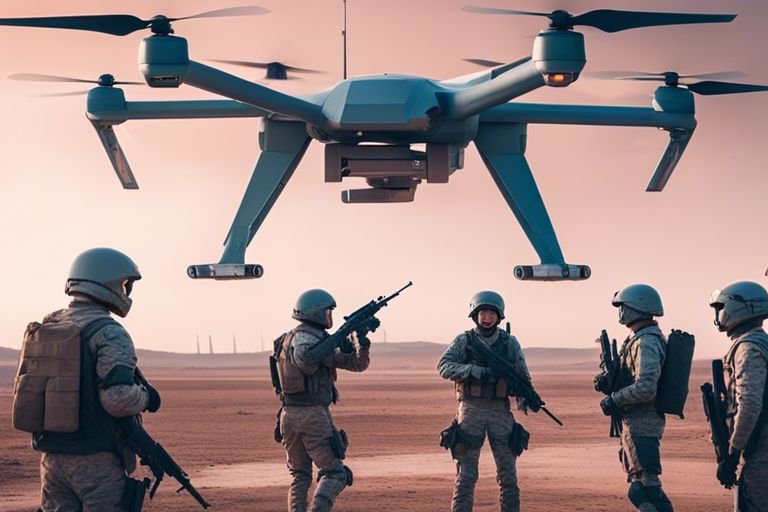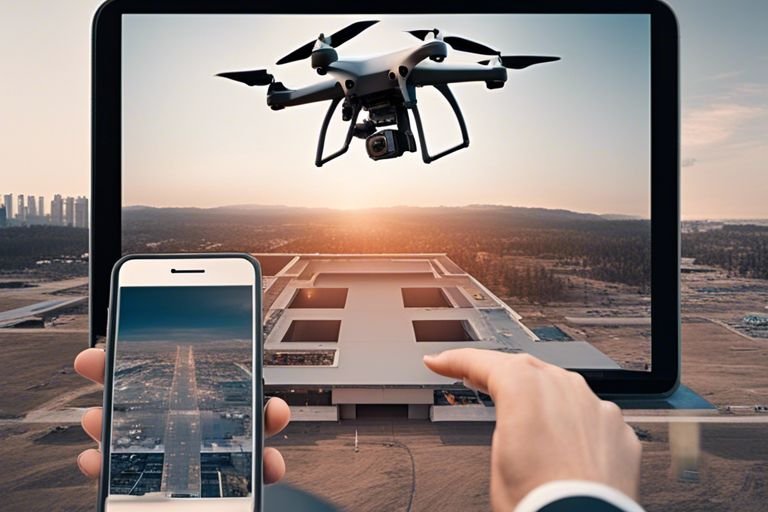What are the potential risks and benefits of AI in military applications?

In today’s world, the utilization of Artificial Intelligence (AI) in military applications has become a common practice. However, there are significant potential risks and benefits associated with this advanced technology. As you delve into the world of AI in military applications, it is crucial to understand the potential risks such as the development of autonomous weapons, the potential for loss of human control, and the ethical implications of using AI in warfare. On the flip side, AI also holds the potential to enhance military decision-making, increase operational effectiveness, and save human lives on the battlefield. This blog post aims to provide you with a comprehensive understanding of the potential risks and benefits of AI in military applications, empowering you to critically assess its implications.
Key Takeaways:
- Risks of AI in Military Applications: AI systems can malfunction or be hacked, leading to unintended consequences and potential loss of human control. There is also the risk of escalating conflicts and increasing the likelihood of warfare due to the use of autonomous weapons.
- Benefits of AI in Military Applications: AI technology can enhance military decision-making, improve precision and accuracy in weapon systems, and reduce human casualties by deploying autonomous systems for dangerous missions. It also has the potential to increase efficiency and effectiveness in military operations.
- Ethical Considerations: The use of AI in military applications raises ethical concerns surrounding the potential for civilian harm, the loss of human agency, and the development of lethal autonomous weapons. It is crucial for policymakers and military leaders to carefully consider the ethical implications of AI in warfare and establish appropriate regulations and safeguards.
Benefits of AI in Military Applications
Even though AI in military applications has raised concerns, it also offers several potential benefits that can significantly enhance military operations and capabilities. These benefits include enhanced decision making, improved operational efficiency, force multiplication and reduced personnel risk, and advanced threat detection and intelligence.
Enhanced Decision Making
AI technologies can process and analyze massive amounts of data at a speed and scale that is impossible for humans to achieve. By leveraging AI, military commanders can make more informed and timely decisions, leading to better outcomes on the battlefield. AI can also help in assessing different scenarios and predicting potential threats, giving you an edge in strategic planning and decision making.
Improved Operational Efficiency
AI can optimize logistics and supply chain management, leading to improved operational efficiency and reduced costs. Through predictive maintenance, AI can also help in identifying equipment maintenance needs before they escalate, ensuring that your military resources are always mission-ready.
Force Multiplication and Reduced Personnel Risk
By automating repetitive tasks and augmenting human capabilities, AI can amplify the effectiveness of military personnel and equipment. This not only enhances your operational capacity but also reduces the exposure of your personnel to dangerous and high-risk situations, making your military operations safer and more effective.
Advanced Threat Detection and Intelligence
AI-powered systems can analyze and interpret vast amounts of data from various sources, including surveillance cameras, sensors, and intelligence reports, to detect potential threats and identify patterns that you may not have noticed. This enables you to proactively address security challenges and safeguard your forces more effectively.
AI can help you in making smarter and quicker decisions, improving overall operational efficiency, multiplying your force strength, and enhancing threat detection and intelligence capabilities. These benefits can empower your military forces and provide a strategic advantage in modern warfare.
Risks of AI in Military Applications
For military applications, AI poses several potential risks that need to be carefully considered and managed. These risks include ethical and legal implications, dependence on technology and vulnerability to cyberattacks, the controversy surrounding lethal autonomous weapons, and the potential for an AI arms race and its impact on global security.
Ethical and Legal Implications
One of the major concerns surrounding the use of AI in military applications is the ethical and legal implications of autonomous decision-making and the potential for AI to violate international laws and ethical guidelines. As AI continues to advance, the question of who is ultimately responsible for the actions of AI systems becomes increasingly complex. The use of AI in warfare raises questions about the protection of civilian populations, the principle of proportionality in armed conflict, and the ethical considerations of delegating life-and-death decisions to machines.
Dependence on Technology and Vulnerability to Cyberattacks
Another risk associated with AI in military applications is the dependence on technology and the vulnerability to cyberattacks. As military systems become more reliant on AI, the potential for adversaries to exploit vulnerabilities in AI systems through cyberattacks grows. This can result in the compromise of critical military operations and the potential for AI systems to be manipulated or controlled by hostile actors, posing significant risks to national security.
Lethal Autonomous Weapons Controversy
The controversy surrounding lethal autonomous weapons (LAWs) is another significant risk of AI in military applications. The development and deployment of LAWs raise concerns about the potential for AI systems to make life-and-death decisions without adequate human oversight. The lack of human judgment and accountability in the use of LAWs raises ethical, legal, and humanitarian concerns, and the potential for unintended consequences and civilian harm.
AI Arms Race and Global Security
The proliferation of AI in military applications raises the potential for an arms race focused on AI technologies and their impact on global security. As countries race to develop and deploy AI-enabled military capabilities, the potential for escalation, miscalculation, and unintended conflict grows. The pursuit of AI superiority in military applications can destabilize international relations and undermine strategic stability, posing significant risks to global security.

Managing the Balance
Your military organization must carefully manage the balance between the potential risks and benefits of AI in military applications. It is essential to harness the capabilities of AI while addressing the associated ethical, legal, and strategic considerations.
Regulatory and Oversight Frameworks
Establishing regulatory and oversight frameworks is crucial to governing the use of AI in military applications. These frameworks should address issues such as accountability, transparency, and compliance with international laws and ethical standards. By implementing robust regulatory and oversight mechanisms, you can mitigate potential risks and ensure responsible use of AI technologies in the military.
International Collaboration and Treaties
Collaboration with international partners and adherence to treaties is essential in the use of AI in military applications. By engaging in cooperative efforts and honoring international agreements, you can promote responsible and ethical deployment of AI technologies. It is important to prioritize diplomatic efforts to establish common guidelines and standards for the use of AI in the military, thereby reducing the potential for misuse and promoting international security and stability.
Research and Development Focus
Your military organization should concentrate on research and development efforts that prioritize the ethical and safe use of AI in military applications. By focusing on the development of AI systems with built-in safeguards and ethical considerations, you can steer the technology towards positive and beneficial outcomes. Emphasizing the ethical and responsible use of AI in military operations is crucial in maintaining public trust and ensuring the technology’s overall contribution to national security.
Case Studies and Current Developments
Despite the ethical and strategic concerns surrounding the use of AI in military applications, the technology has continued to advance with the development of various case studies and current projects. Here are some notable examples:
- Project Maven: This project involved the use of AI to analyze drone surveillance footage and identify potential targets, resulting in a significant increase in the speed and accuracy of target identification.
- Autonomous Weapons Systems: Several countries have been developing AI-powered autonomous weapons systems, raising concerns about the potential for these systems to make lethal decisions without human intervention.
- Command and Control Systems: AI is being integrated into command and control systems to improve decision-making processes and enhance situational awareness on the battlefield.
Notable AI Military Projects
One notable AI military project is the development of unmanned combat aerial vehicles capable of autonomous decision-making in combat situations. These UAVs have the potential to revolutionize modern warfare by reducing the risk to human personnel and enabling faster and more precise targeting capabilities.
Lessons Learned from Real-World Applications
As AI continues to be integrated into military applications, important lessons have been learned from real-world applications. One of the key takeaways is the need for robust ethical guidelines and legal frameworks to govern the use of AI in military contexts. Additionally, the potential for unintended consequences and unforeseen challenges must be carefully considered when deploying AI technologies in military operations.
Conclusion
With these considerations in mind, it is evident that there are significant potential risks and benefits to the use of AI in military applications. On the one hand, AI has the potential to enhance military capabilities, improve decision-making processes, and reduce human casualties. On the other hand, the use of AI in warfare raises ethical concerns, including the risk of autonomous weapons making decisions with lethal consequences without human intervention. As such, it is crucial for military organizations to carefully consider the ethical implications and ensure that AI is used responsibly and in accordance with international laws and regulations. While there is great promise in the use of AI in military applications, it is imperative to proceed with caution and thoughtful consideration of the potential impacts.



